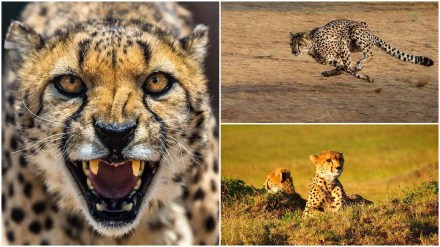After a wait of 70 years, Cheetahs are all set to make a comeback in Indian Jungles. The introduction of Cheetah in India is being done under Project Cheetah, which is world’s first inter-continental large wild carnivore translocation project. On his birthday, Prime Minister Narendra Modi will visit Madhya Pradesh’s Kuno National park on 17 September and will release a group eight wild Cheetahs from Namibia. The big cats were last seen in Indian wilderness in early 50s and went declared extinct around 1952 from Indian jungles. Efforts are being made to revitalise and diversify India’s wildlife and its habitat again and the release of wild Cheetahs by PM Modi in Kuno National Park follows the same footsteps.
Cheetahs are world’s fastest land animal and can attain the speed of 80-100 kmph and acceleration from 0-90 kmph in just 3 seconds. The word Cheetah is derived from Sanskrit Chitraka which means spotted. Kuno National Park has been selected as Cheetah’s new habitat in India due to the availability of diverse wildlife, large spaces and grasslands for hunting and habitat, climate condition and distance from big population centres.
A tiger-faced jet landed in Windhoek to bring Cheetahs from Namibia to Sheopur’s Kuno National Park. “A special bird touches down in the Land of the Brave to carry goodwill ambassadors to the Land of the Tiger. “ Indian Embassy in Namibia tweeted. The eight cheetahs – five females and three males will be brought from Namibia’s capital Windhoek to Gwalior airport in a customised Boeing 747-400 aircraft.
The plane with eight wild Cheetahs will land in Gwalior and from there IAF’s special helicopters, probably Chinook heavy lift helicopters, will ferry these wild felines to Kuno National Park. As per the earlier plan, the special plane carrying these animals was to land in Jaipur from the African country, from where they were scheduled to be flown to the Kuno.
India and Namibia signed an MoU earlier this year to translocate the Big Cats from that country. This is world’s first inter-continental large wild carnivore translocation project and has been named Project Cheetah. These wild big cats are critical in the restoration of open forest and grassland ecosystems in India. Presence of Cheetah in India’s wild ecosystem will help conserve biodiversity and enhance the services like water security, carbon sequestration and soil moisture conservation, benefiting the society at large.
This effort towards environment protection and wildlife conservation, will also lead to enhanced livelihood opportunities for the local community through eco-development and ecotourism activities.
The Cheetah Conservation Fund (CCF), an international not-for-profit organisation headquartered in Namibia and dedicated to saving the cheetah in the wild, the five female cheetahs are aged between two and five years and the male cheetahs are aged between 4.5 years and 5.5 years. The last cheetah in India died in 1947 in Korea district in present day Chhattisgarh, which was earlier part of Madhya Pradesh, and the species was declared extinct from India in 1952. The ‘African Cheetah Introduction Project in India’ was conceived in 2009 and a plan to introduce the big cat by November last year in KNP suffered a setback due to the COVID-19 pandemic.
